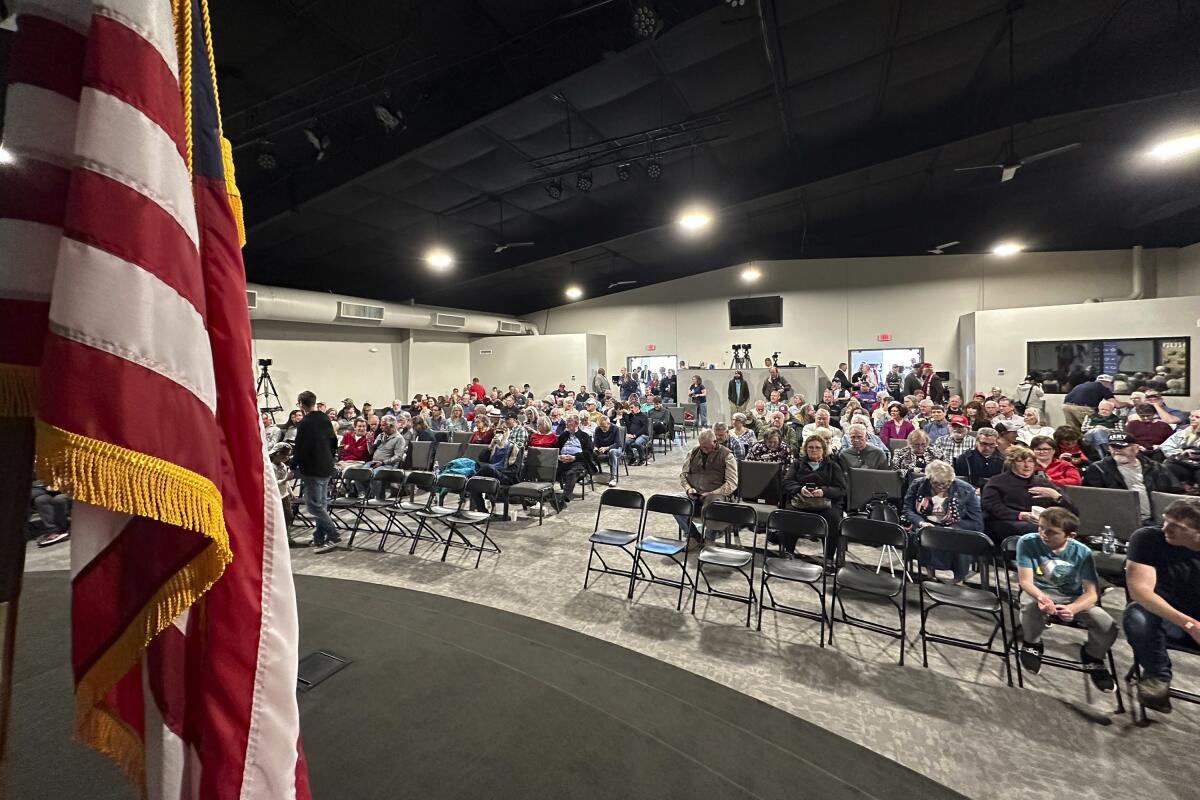Trump wins Idaho, Missouri caucuses, sweeps Michigan convention as he nears GOP nomination

- Share via
Former President Trump continued his march toward the Republican presidential nomination Saturday, winning caucuses in Idaho and Missouri and sweeping the delegate haul at a party convention in Michigan.
Nikki Haley, the former United Nations ambassador who is his last major Republican rival, was still searching for her first election-year win.
There were no Democratic contests Saturday.
The next event on the Republican calendar is Sunday in the District of Columbia. Two days later is Super Tuesday, when 16 states and American Samoa will hold contests on the largest day of voting of the year before the November election. Trump is on track to lock up the GOP nomination days later.
Campaigning in North Carolina, Trump further escalated his immigration rhetoric and baselessly accused President Biden of waging a “conspiracy to overthrow the United States of America.”
Trump has a long history of trying to turn attack lines back on his rivals in an attempt to diminish their impact.
Biden, the leading candidate for the Democratic presidential nomination, has cast Trump as a threat to democracy, pointing to the former president’s efforts to overturn the results of the 2020 election after he lost to Biden. Those efforts culminated in the attack on the U.S. Capitol on Jan. 6, 2021, as his supporters tried to halt the peaceful transition of power.
At a rally in Greensboro, N.C., on Saturday, Trump called himself “a political dissident.”
He also promised that if elected, he would begin “the largest domestic deportation operation in American history” on the first day of his second administration.
Michigan
At their convention in Grand Rapids, Michigan Republicans met to allocate 39 of the state’s 55 GOP presidential delegates. Trump won all 39 delegates.
But a significant portion of the party’s grassroots force skipped the gathering after a months-long dispute over the party’s leadership.
Trump handily won Michigan’s primary Tuesday with 68% of the vote to Haley’s 27%.
Michigan Republicans were forced to split their delegate allocation into two parts after Democrats, who control the state government, moved Michigan into the early-primary states, which violated the national Republican Party’s rules.
Missouri
Voters lined up outside a church in Columbia, home to the University of Missouri, before the doors opened for the caucuses. Once they got inside, they heard appeals from supporters of the candidates.
“Every 100 days, we’re spending $1 trillion, with money going all over the world. Illegals are running across the border,” Tom Mendenall, an elector for Trump in 2016 and 2020, said to the crowd. He later added: “You know where Donald Trump stands on a lot of these issues.”
Seth Christensen, a 31-year-old from Columbia who came to the caucus with his wife and three children, ages 7, 5 and 2, then urged Republicans to go in a new direction.
“I don’t need to hear about Mr. Trump’s dalliances with people of unsavory character, nor do my children,” Christensen said to the room. “And if we put that man in the office, that’s what we’re going to hear about all the time. And I’m through with it.”
Supporters quickly moved to one side of the room or the other to indicate whether they favored Trump or Haley. There was little discussion among caucusgoers after they chose sides.
This year was the first test of a new system, run almost entirely by volunteers on the Republican side.
The caucuses were organized after GOP Gov. Mike Parson signed a 2022 law that, among other things, canceled the 2024 presidential primary, planned for March 12.
Lawmakers failed to reinstate the primary despite calls to do so by leaders of the state Republican and Democratic parties. Democrats now plan a party-run primary March 23.
Trump prevailed twice under Missouri’s old presidential primary system.
Idaho
Last year, Idaho lawmakers passed cost-cutting legislation that was intended to move all of the state’s primaries to the same date in May. But the bill inadvertently eliminated the presidential primaries entirely.
The Republican-led Legislature considered holding a special session to reinstate the presidential primaries, but failed to agree on a proposal in time, leaving both parties with presidential caucuses as their only option.
“I think there’s been a lot of confusion because most people don’t realize that our Legislature actually voted in a flawed bill,” Jessie Bryant, who volunteered at a caucus site near downtown Boise, said before Trump was declared Idaho’s winner. “So the caucus is really just the best-case scenario to actually get an opportunity to vote for a presidential candidate and nominate them for the GOP.”
The state’s Democratic caucuses are May 23.
AP writers Rebecca Boone in Boise, Idaho; Joey Cappelletti in Lansing, Mich.; Summer Ballentine in Jefferson City, Mo.; and Bill Barrow and Jill Colvin in Greensboro, N.C., contributed to this report.
More to Read
Get the L.A. Times Politics newsletter
Deeply reported insights into legislation, politics and policy from Sacramento, Washington and beyond. In your inbox twice per week.
You may occasionally receive promotional content from the Los Angeles Times.






